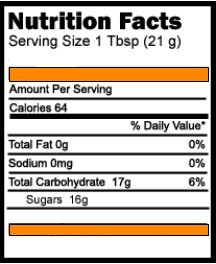Honey Nutrition Facts
How can we miss these important honey nutrition facts when trying to understand what honey is made of and its benefits? Here I have the information:
Nectar itself is composed mainly of sucrose and water. Bees add enzymes that create additional chemical compounds, inverting the sucrose into fructose and glucose, and then evaporate the water so that the resulting product will resist spoiling.
Hence, honey is a source of carbohydrates, containing
• 80% natural sugar -- mostly fructose and glucose. Due to the high level of fructose, honey is sweeter than table sugar.
• 18% water. The less water content the honey has, the better the quality of honey.
• 2% minerals, vitamins, pollen and protein.
The vitamins present in honey are B6, thiamin, niacin, riboflavin, pantothenic acid and certain amino acids. The minerals found in honey include calcium, copper, iron, magnesium, manganese, phosphorus, potassium, sodium and zinc. I learnt that "conductivity" is an indirect way of measuring the mineral content of a honey. Manuka honey has a higher than normal conductivity -- about 4 times that of normal flower honeys. The higher the conductivity, the better the value of the honey.
Also, some very encouraging honey nutrition facts:
This natural sweetener has antioxidants -- , is fat free, cholesterol free, and sodium free!
More Honey Facts on Calories, GI
 * One tablespoon of natural sweetener honey contains 64 calories.
* One tablespoon of natural sweetener honey contains 64 calories.
* Honey has a healthy Glycemic Index (GI), meaning that its sugars can be gradually absorbed into the bloodstream to result in better digestion. We should try to avoid eating excessive high-glycemic foods which would prompt an elevated insulin release in our body as a result of the pancreas being stimulated to metabolize the sudden surge of glucose into the blood.
* Honey contains natural minerals and vitamins which help the metabolizing of undesirable cholesterol and fatty acid on the organs and tissues into the system, hence preventing obesity and promoting better health for us.
Related Honey FAQs
Learn some interesting facts from -- Honey FAQs.
Read about the latest theory based on the hibernation diet which builds a link between eating honey before going to bed and losing weight!
How Much Honey Can We Eat Daily?
We all know that nothing, however good, when consumed in excess is good. So, how much honey can we eat every day? What is considered too much? Get the answers in About Honey - How much honey can I eat every day?
